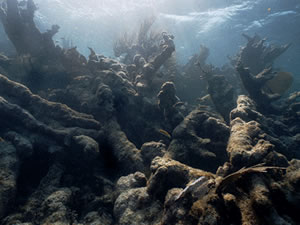
Global warmings'Evil Twin' threatens Reef
Fri 09 Apr
Global warming's 'Evil Twin' threatens Reef

As if it isn't bad enough that this week we have a Chinese tanker mashing the Great Barrier Reef, international marine scientists warned yesterday that the continued rise in human carbon dioxide emissions is driving highly dangerous and fundamental changes in the chemistry and ecosystems of the world’s oceans.
The researchers report in the latest issue of the journal 'Trends in Ecology and Evolution' that Ocean conditions are already more extreme than anything marine organisms and ecosystems would have experienced for millions of years'. 'This emphasises the urgent need to adopt policies that drastically reduce carbon dioxide (CO2) emissions.'
Ocean acidification, which the researchers call the ‘evil twin of global warming’, is caused when the CO2 emissions, mainly from burning fossil fuels, dissolves into the oceans. It is apparently happening independently of global warming but when combined has a double whammy effect!
Co-author Professor Ove Hoegh-Guldberg of the ARC Centre of Excellence for Coral Reef Studies and The University of Queensland says, 'Evidence gathered by scientists around the world over the last few years suggests that ocean acidification could represent an equal or perhaps even greater threat to the biology of the planet than global warming.'
More than 30% of the CO2 released from burning fossil fuels, cement production, deforestation and other human activities goes straight into the oceans, turning them more and more acidic.
The professor also added, 'The resulting acidification will impact many forms of sea life, especially organisms whose shells or skeletons are made from calcium carbonate, like corals and shellfish. It may also interfere with the reproduction of plankton species which are a vital part of the food web on which fish and all other sea life depend'.
The scientists say there is now persuasive evidence that mass extinctions in past Earth history, like the 'Great Dying' of 251 million years ago and another wipeout 55 million years ago, were accompanied by ocean acidification, which may have delivered the deathblow to many species that were unable to cope with it.
Given the impacts seen in the fossil records, there is no question about the need to immediately reduce the rate at which carbon dioxide is being emitted into the atmosphere.
Prof. Hoegh-Guldberg says, "Future acidification depends on how much CO2 humans emit from here on but by the year 2100 various projections indicate that the oceans will have acidified by a further 0.3 to 0.4 pH units, which is more than many organisms like corals can stand'. This will create conditions not seen on Earth for at least 40 million years. These changes are taking place at rates as much as 100 times faster than they ever have over the last tens of millions of years".
Besides directly impacting on the fishing industry and its contribution to the human food supply at a time when global food demand is doubling, a major die-off in the oceans would affect birds and many land species and change the biology of Earth as a whole profoundly, Prof. Hoegh-Guldberg concluded.
Editors Comments: It seems almost trivial to mention the affect that this will all have on our tourism industry in light of the enormity of the looming catastrophe but it will affect all of us who rely on the Reef as a source of income. Somehow, we've got to stop 'pussyfooting' around this issue and bring the offending nations into line to cut, if not cease, their carbon emissions.
I appreciate that sounds like an over-simplification for the solution but with the threat explained in the above article over all our heads, I'm not sure why there could possibly be a counter argument to it! Of course if someone could invent a synthetic process for photosynthesis then we could turn all the carbon emissions into Oxygen and solve the problem that way. What about a government grant to fund some research, I'm sure I could find a good botanist to help me!